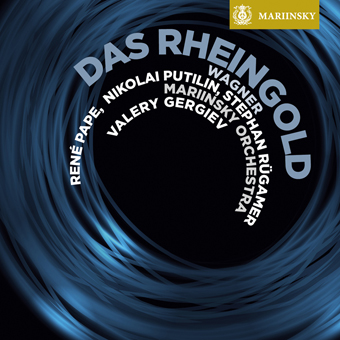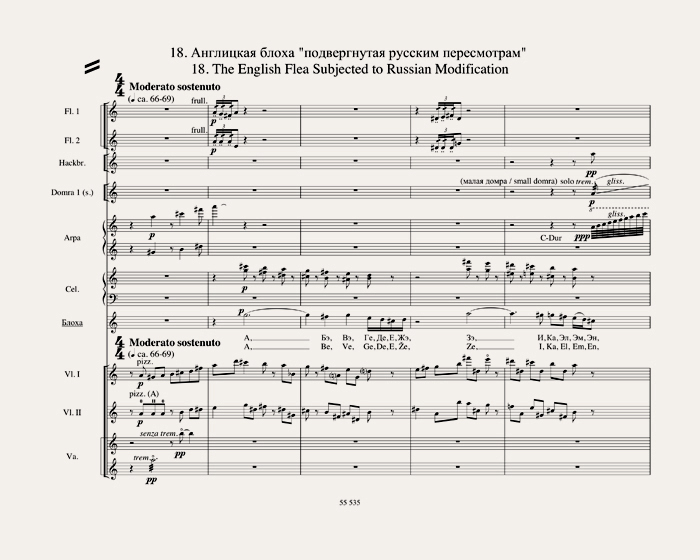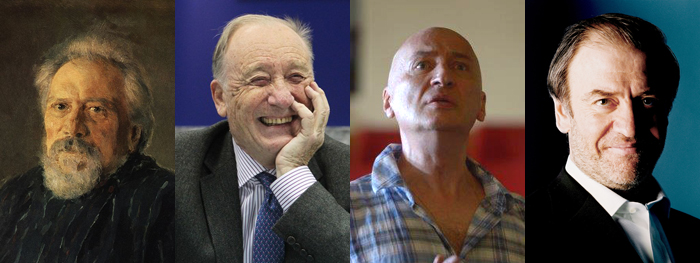Premiere
Rodion Shchedrin The Lefthander
Production by Alexei Stepanyuk
Musical Director and Conductor: Valery Gergiev
Mariinsky II (new stage)
Saturday, July 27, 5:00PM
Sunday, July 28, 8:00PM
Rodion Shchedrin The Lefthander
Production by Alexei Stepanyuk
Musical Director and Conductor: Valery Gergiev
Mariinsky II (new stage)
Saturday, July 27, 5:00PM
Sunday, July 28, 8:00PM
On Saturday, July 27
and Sunday, July 28
the stage of the new Mariinsky Theatre (Mariinsky II) will see the premiere of Rodion Shchedrin’s most recent opera The Lefthander
based on Nikolai Leskov’s novel of the same name. The staged version directed by Alexei Stepanyuk
will be conducted by Valery Gergiev. The opera was commissioned by the Mariinsky Theatre and composed
to Maestro Gergiev’s 60th birthday and opening of the new theatre (Mariinsky II).
The Lefthander will become the composer’s sixth work in the repertoire of the Mariinsky Theatre alongside his operas The Enchanted Wanderer (2008) and Dead Souls (2011) as well as ballets The Little Humpbacked Horse (2009), Anna Karenina (2010) and Carmen Suite (1967, joined the Mariinsky repertoire in 2010). Valery Gergiev often conducts Shchedrin’s works in his concerts and recorded the opera The Enchanted Wanderer, fragments from The Little Humpbacked Horse, Concerto for Orchestra No. 1 “Naughty Limericks”, and Piano Concerto No. 5. There will be a video-recording of Shchedrin’s opera Dead Souls.
For Alexei Stepanyuk, The Lefthander is the second production of Shchedrin’s opera — in July 2008 he staged The Enchanted Wanderer, also based on Nikolai Leskov’s novel. The production had a tremendous success and was taken by the Mariinsky Opera on tour to seven cities.
The Lefthander will become the composer’s sixth work in the repertoire of the Mariinsky Theatre alongside his operas The Enchanted Wanderer (2008) and Dead Souls (2011) as well as ballets The Little Humpbacked Horse (2009), Anna Karenina (2010) and Carmen Suite (1967, joined the Mariinsky repertoire in 2010). Valery Gergiev often conducts Shchedrin’s works in his concerts and recorded the opera The Enchanted Wanderer, fragments from The Little Humpbacked Horse, Concerto for Orchestra No. 1 “Naughty Limericks”, and Piano Concerto No. 5. There will be a video-recording of Shchedrin’s opera Dead Souls.
For Alexei Stepanyuk, The Lefthander is the second production of Shchedrin’s opera — in July 2008 he staged The Enchanted Wanderer, also based on Nikolai Leskov’s novel. The production had a tremendous success and was taken by the Mariinsky Opera on tour to seven cities.
Please note that the start time of performances has changed from the originally announced: the performance on Saturday,
July 27
will start at 5:00PM (instead of previously announced 7:00PM), the performance on Sunday,
July 28
will start at 8:00PM (instead of previously announced 5:00PM).
Tickets may be exchanged at box-offices or refunded. We apologise for any inconvenience.
Rodion Shchedrin speaks about his opera:
Leskov’s tale is an incredibly rich literary source for an opera plot. The plot of the tale itself is a grotesque exaggeration. What is it? Is it a Biblical parable, a farcical fairground myth, or an epic tale? The characters are vivid, luscious and contrasting. The Russian Emperors Alexander I and Nicholas I, the Winter Palace, the British Court — a buffonade and a tragedy. Laughter through tears... But if you look a little deeper then you can clearly see the artistic contradistinctions of two kinds of life — the rational British and the irrational Russian.
And, finally, there is the protagonist. The cross-eyed illiterate artisan with “golden hands” from Tula. He is a condensed representation, I believe, of the most important and the most typical features of the Russian national character — innate talent, wit, self irony, indifference to human life and a pernicious love of alcohol. And the eternal Russian theme of power and the common man. The lack of need for genius in one’s own country.
Leskov’s tale is an incredibly rich literary source for an opera plot. The plot of the tale itself is a grotesque exaggeration. What is it? Is it a Biblical parable, a farcical fairground myth, or an epic tale? The characters are vivid, luscious and contrasting. The Russian Emperors Alexander I and Nicholas I, the Winter Palace, the British Court — a buffonade and a tragedy. Laughter through tears... But if you look a little deeper then you can clearly see the artistic contradistinctions of two kinds of life — the rational British and the irrational Russian.
And, finally, there is the protagonist. The cross-eyed illiterate artisan with “golden hands” from Tula. He is a condensed representation, I believe, of the most important and the most typical features of the Russian national character — innate talent, wit, self irony, indifference to human life and a pernicious love of alcohol. And the eternal Russian theme of power and the common man. The lack of need for genius in one’s own country.

|
Richard Wagner Das Rheingold
The Mariinsky Label recording
In early September the Mariinsky Label will release the recording of Das Rheingold, the first part of Richard Wagner’s Ring cycle.
The recording made at the Mariinsky Concert Hall features baritone Nikolai Putilin as Alberich,
bass-baritone René Pape as Wotan, tenor Stephan Rügamer as Loge
as well as the Mariinsky Opera Soloists and the Mariinsky Theatre Orchestra conducted by Valery Gergiev.
This recording continues our project of recording the complete Ring cycle.
Die Walküre,
its second part, was released in February, Siegfried and Götterdämmerung will complete the cycle in 2014.
Das Rheingold will become available as 2-disc Super Audio CD box as well as iTunes download.
|
|
|
|
||||||||||||||||||||||||||||||||||||||||||
|
||||||||||||||||||||||||||||||||||||||||||||



